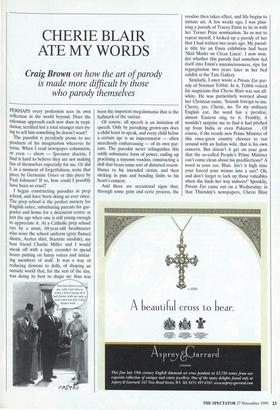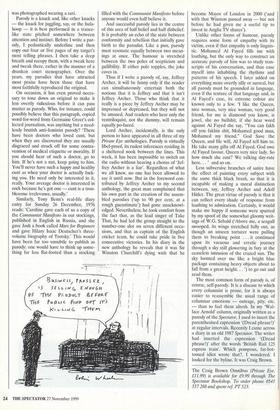CHERIE BLAIR ATE MY WORDS
Craig Brown on how the art of parody is made more difficult by those who parody themselves
PERHAPS every profession sees its own reflection in the world beyond. Does the salesman approach each new door in trepi- dation, terrified lest a total stranger start try- ing to sell him something he doesn't want?
The parodist is peculiarly prone to see Products of his imagination wherever he turns. When I read newspaper columnists, or even — ahem — Spectator diarists, I find it hard to believe they are not making fun of themselves especially for me. Or did I, in a moment of forgetfulness, write that piece by Germaine Greer or this piece by Paul Johnson? If so, how could I possibly have been so cruel?
I began constructing parodies at prep school, and have been doing so ever since. The prep school is the perfect nursery for English satire, substituting parents for gar- goyles and home for a detention centre at just the age when one is still young enough to appreciate it. At a Catholic prep school run by a stout, 60-year-old headmaster Who wore the school uniform (grey flannel shorts, Aertex shirt, Startrite sandals), my best friend Charlie Millet and I would sneak off with a tape recorder to spend hours putting on funny voices and imitat- ing members of staff. It was a way of reducing demons to dolls, of shaping an outside world that, for the rest of the day, was doing its best to shape us: thus was
You had dinner with nw. only I ga him to write a letter saying he'd had dinner with ,nn only it now turns DIN that I had
dinner with ..,
born the impotent megalomania that is the hallmark of the satirist.
Of course, all speech is an imitation of speech. Only by parodying grown-ups does a child learn to speak, and every child below a certain age is an impersonator — often mercilessly embarrassing — of its own par- ents. The parodist never relinquishes this oddly submissive form of power, ending up practising a toytown voodoo, constructing a doll that bears some sort of distorted resem- blance to his intended victim, and then sticking in pins and bending limbs to his heart's content.
And there are occasional signs that, through some grim and eerie process, the voodoo then takes effect, and life begins to imitate art. A few weeks ago, I was plan- ning a parody of Tracey Emin to tie in with her Turner Prize nomination. So as not to repeat myself, I looked up a parody of her that I had written two years ago. My parod- ic title for an Emin exhibition had been 'Skid Marks on Clean Linen'. I now won- der whether this parody had somehow fed itself into Emin's unconsciousness, ripe for regurgitation two years later in her bed exhibit at the Tate Gallery.
Similarly, I once wrote a Private Eye par- ody of Norman Tebbit. In it, Tebbit voiced his suspicions that Cherie Blair was not all- white. He was particularly worried about her Christian name. 'Sounds foreign to me. Cherry, yes. Cherie, no. To my ordinary English ear, the word has a peculiar, almost Eastern ring to it. Frankly, it wouldn't surprise me to find it had pitched up from India or even Pakistan ... Of course, if the trendy new Prime Minister of this once-great country chooses to run around with an Indian wife, that is his own concern. But doesn't it get on your goat that the so-called People's Prime Minister can't come clean about his predilections? A word in your ear, Blair. Isn't it high time your forced your missus into a sari? Oh, and don't forget to lock up those valuables when she finds her way indoors!' Spookily, Private Eye came out on a Wednesday; in that Thursday's newspapers, Cherie Blair
was photographed wearing a sari.
Parody is a knack and, like other knacks — the knack for juggling, say, or the hula- hoop — it is best performed in a trance- like state pitched somewhere between attention and instinct. Before I write a par- ody, I pedantically underline and then copy out four or five pages of my target's most telling phrases. 1 then take a deep breath and recopy them, with a tweak here and tweak there, rather in the manner of a drunken court stenographer. Over the years, my parodies that have attracted most praise have been those that have most faithfully reproduced the original.
On occasion, it has even proved neces- sary to tone down an original to make it less overtly ridiculous before it can pass muster as parody. Who, for instance, could possibly believe that this paragraph, copied word-for-word from Germaine Greer's col- lected journalism, was anything but a need- lessly brutish anti-feminist parody? 'There have been doctors who loved cunt, but when they are discovered they are usually disgraced and struck off for some contra- vention of medical etiquette or morality. If you should hear of such a doctor, go to him. If he's not a nut, keep going to him. You'll never have such a happy and healthy cunt as when your doctor is actually fuck- ing you. He need only be interested in it, really. Your average doctor is interested in cock because he's got one — cunt is a trou- blesome irrelevance, usually.'
Similarly, Tony Benn's real-life diary entry for Sunday 26 December, 1976 reads: 'Caroline gave each of us a copy of the Communist Manifesto in our stockings, published in English in Russia, and she gave Josh a book called Marx for Beginners and gave Hilary Isaac Deutscher's three- volume biography of Trotsky.' This would have been far too unsubtle to publish as parody: one would have to think up some- thing far less flat-footed than a stocking filled with the Communist Manifesto before anyone would even half believe it.
And successful parody lies in the centre of this area of half belief and half disbelief. It is probably an echo of the state between conformity and rebellion that initially gave birth to the parodist. Like a pun, parody must resonate equally between two mean- ings at once. The humour is stretched between the two poles of scepticism and gullibility. If either pole topples, the joke caves in.
Thus if I write a parody of, say, Jeffrey Archer, it will be funny only if the reader can simultaneously entertain both the notions that it is Jeffrey and that it isn't Jeffrey Archer. Those who think that it really is a piece by Jeffrey Archer may be impressed or depressed, but they will not be amused. And readers who hear only the ventriloquist, not the dummy, will remain equally p0-faced.
Lord Archer, incidentally, is the only person to have appeared in all three of my Private Eye anthologies. Parody is virtually libel-proof, its rudest inferences residing in a sheltered nook between the lines. This week, it has been impossible to switch on the radio without hearing a chorus of 'Jef- frey Archer is a liar'. Regardless of what we all knew, no one has been allowed to say it until now. But in the foreword con- tributed by Jeffrey Archer to my second anthology, the great man complained that his own part in the creation of the assem- bled parodies Cup to 90 per cent, at a rough guesstimate') had gone unacknowl- edged. Nevertheless, he took comfort from the fact that, as the lead singer of Take That, he had led the group straight to the number-one slot on seven different occa- sions, and that as captain of the English cricket team, he could take pride in five consecutive victories. In his diary in the new anthology he reveals that it was Sir Winston Churchill's dying wish that he become Mayor of London in 2000 ('and with that Winston passed away — but not before he had given me a useful tip to invest in Anglia TV shares').
Unlike other forms of humour, parody requires some form of empathy with its victim, even if that empathy is only linguis- tic. Mohamed Al Fayed fills me with loathing, but the only way to construct an accurate parody of him was to study tran- scripts of his conversation, and thus ease myself into inhabiting the rhythms and patterns of his speech. I later added on everything more overtly silly or surreal, but . all parody must be grounded in language, even if the texture of that language and, in Al Fayed's case, its extreme colour are known only to a few. 'I like the Queen, nice woman, very nice woman, very good friend, for me is diamond you know, is jewel, she no bullshit, if she hear word against Al Fayed she say, "You can fakh off you fakhin shit, Mohamed good man, Mohamed my friend." God Save the Queen, and He will, Al Fayed tell him to. He take many gifts off Al Fayed. God owe Al Fayed favour. Queen very nice lady. So how much she cost? We talking day-rate here. .. ' and so on.
Less subversive branches of satire have the effect of painting every subject with the same thick black brush, so that it is incapable of making a moral distinction between, say, Jeffrey Archer and Adolf Hitler. The great virtue of parody is that it can reflect every shade of response from loathing to admiration. Certainly, it would make me happy if someone were spurred by my spoof of the somewhat gloomy writ- ings of W.G. Sebald ('Above me, a seagull swooped, its wings stretched fully out, as though an unseen torturer were pulling them to breaking point . .. it continued upon its vacuous and erratic journey through a sky still glowering in fury at the ceaseless intrusion of the crazed sun. The sky loomed over me like a bright blue package containing heavy objects about to fall from a great height. .. ') to go out and read them.
The most common form of parody is, of course, self-parody. It is a disease to which every columnist is prone, for it is always easier to reassemble the usual range of columnar emotions — outrage, pity, etc. — than to feel them afresh. In my 'Wal- lace Arnold' column, originally written as a parody of the Spectator, I used to insert the parenthesised expression '(Dread phrase!)' at regular intervals. Recently I came across a diary in an old 1987 Spectator. The writer had inserted the expression '(Dread phrase!)' after the words 'British Rail 125 express train'. Which pompous, fat-bot- tomed idiot wrote that?, I wondered. I looked for the byline. It was Craig Brown.
The Craig Brown Omnibus (Private Eye, £21.99) is available for £9.99 through The Spectator Bookshop. To order phone 0541 557 288 and quote ref PT 523.



























































































 Previous page
Previous page